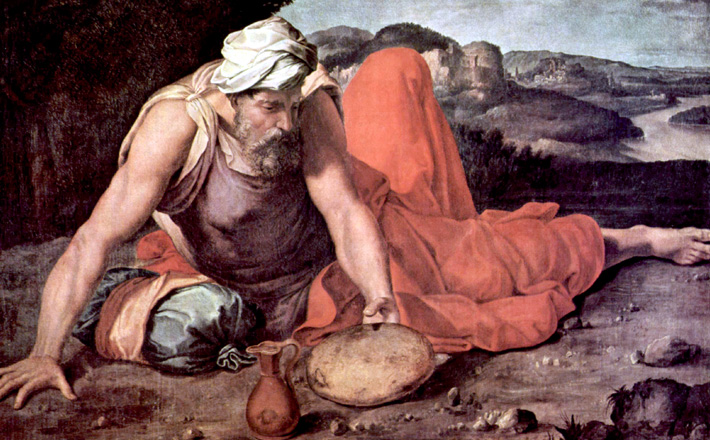Commentary on Luke 8:26-39
Gospel stories of demon possession are difficult to preach, because we don’t experience demons as described in the Bible.
However, all the “demons” Jesus confronts have three things in common: they cause self-destructive behavior in the victim, the victim feels trapped in that condition, and they separate the victim from normal living in the family circle. Sound familiar? Don’t many of us suffer from the same kind of snares and burdens?
If we define “demons” as those forces which have captured us and prevented us from becoming what God intends us to be, we are as surrounded by — yes, possessed by — as many demons as those whom Jesus encountered. Our demons can be of many kinds: mental illnesses, schizophrenia, paranoia, addictions, obsessions, destructive habits, and so on.
Note the similarities between this demon-possessed man and the demons that possess us. He was totally cut off from family and society. He didn’t live as people, but “in the tombs,” probably in caves that were used as burying places. He was also “driven by the demon into the wilds.” In other words, he was already in a “living death,” separated from normal people and normal living.
Furthermore, the demons were harming him. In Mark’s version he was “bruising himself with stones” (Mark 5:1-20). Thirdly, in Mark’s version “no one could restrain him anymore, even with a chain.” Fourthly, and most sadly, he was so totally possessed that though the demons recognized Jesus as “Son of the Most High God,” but the man could not free himself.
The point of this story, as well as all the demon-healing stories in the Gospels is that the power of God can cast out demons. The seventy persons sent out by Jesus soon afterward came back and reported, no doubt with astonishment, “Lord, in your name even the demons submit to us!” (Luke 10:17)
This is the key to the success of Alcoholic Anonymous, whose “twelve steps” to healing” begin with these three:
1.We admitted we were powerless over our addiction, that our lives had become unmanageable.
2. We came to believe that a Power greater than ourselves could restore us to sanity.
3. We made a decision to turn our will and our lives over to the care of God, as we understood Him.
Alcoholism is a terrible problem in the former Soviet Union. Before the collapse of the USSR, Soviet officials appealed to American AA members to help them set up AA groups. However, because the Soviet Union was officially atheistic, they asked that these first three steps be omitted in adapting AA to them. The Americans refused, stating that those three steps are basic to their program. We need God to free us from our demons.
Members of AA also realize they not only need God’s help but the support of people around them. In almost all of Jesus’ stores of healing, there is restoration to families and townspeople. For the healing of demons today, the fellowship of family, congregation and community is a key to restoration. Becoming free from our demons is seldom a “do-it-yourself” project. We need help. We need God’s help, and we need the help of other people.
All this is happening in this story.
Today’s listeners, attuned to animal rights and the SPCA, will be bothered by the fact that “a large herd of swine” was drowned after the demons entered them. In that setting, however, pigs were considered an unclean animal. It was fitting that sinful demons would be consigned to unclean animals and that, being destructive, would drive the animals to death — just as the man had been dead to the world around him before his healing.
At the end of the story, the man “had been healed,” a word from the Greek sozo, which can also be translated “saved,” “delivered,” or “made whole.” He is not only delivered from the demon and not only “cured” of the terrible burden, but had been altogether “healed” and “saved.” That leads into the important last verse of the story: “He went away, proclaiming throughout the city how much Jesus had done for him.” He has not only become a follower of Jesus, but a “proclaimer” as well.
We call Matthew 28:18-20 the “Great Commission.” Verse 39 in this story is shorter but an equally urgent commission, given not only to the healed man in the story, but also to us: “Return to your home, and declare how much God has done for you”!
In Luke’s gospel this is the only healing Jesus does in Gentile territory. This man proclaiming his healing throughout the city is a foretaste of the mission of the seventy at the beginning of the next chapter.
In preaching about this text, the preacher might want to show how Jesus meets us at our greatest needs. Look before and after this text (a good idea with any text). Jesus brings healing to the different situations where healing is needed. In the previous chapter (7:36-50), a woman “who was a sinner,” bursts in on the supper as Simon the Pharisee’s is hosting Jesus, kneels weeping before Jesus and washes his feet with her tears — all despite the objections of Simon the host. Jesus’ healing word to her was, “Your sins are forgiven… Your faith has saved you; go in peace” (7:48-50).
In the paragraph before today’s text, the disciples are in a boat with Jesus when “a windstorm swept down on the lake,” and the disciples are terrified that they will drown. Jesus awakes and “rebuked the wind and the raging waves, and they ceased” (8:22-25). The disciples may well have thought of the storm as a force of evil, and Jesus shows his command even of the forces of nature.
The story immediately following today’s gospel contrasts the double healing of the twelve-year-old girl and the woman suffering twelve years from hemorrhages — a dead, innocent little girl and a ritually unclean woman. The girl can do nothing for her resuscitation; the woman takes the initiative herself and touches Jesus’ robes. The girl has a grieving family; the woman is alone. The girl can’t act out of faith; the woman reaches out from faith. Almost opposite circumstances, yet Jesus heals them both. (You can tell the story this Sunday, because it won’t occur in the lectionary until the summer of 2015, when we read it from Mark 5:21-43.)
So in this short stretch Jesus brings deliverance from a sinful, guilty conscience, from demons, from a raging storm, from a long-term physical ailment, and from death itself!


June 23, 2013